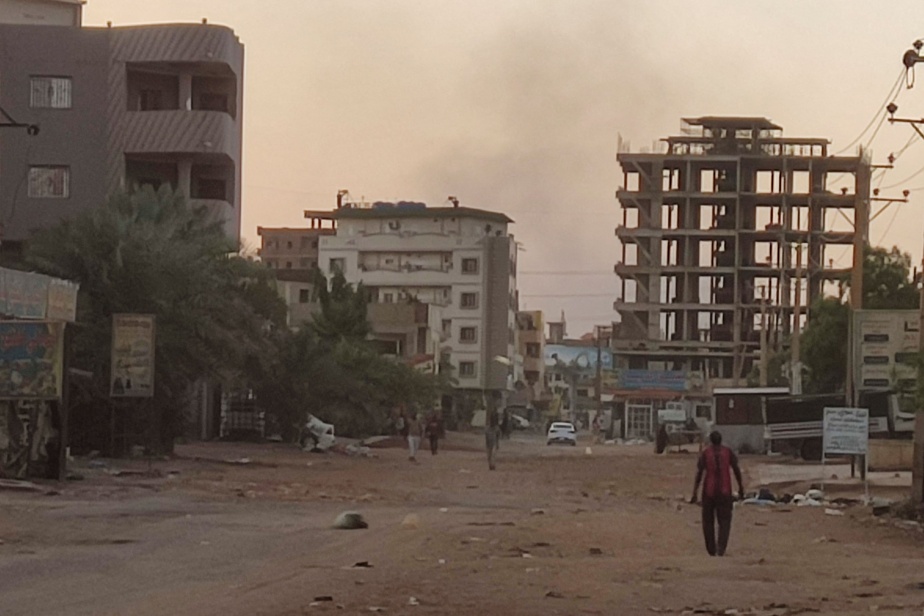(Khartoum) UN chief Antonio Guterres said on Wednesday that the world had “failed” to prevent the war between rival generals that is tearing Sudan apart, where the UN now wants guarantees to deliver humanitarian aid in the middle fights.
Despite the announcement of an “ agreement in principle ” for an extension until May 11 of a truce never respected until now, “ clashes and explosions ” occurred on Wednesday in Khartoum, overflown by military planes , residents told AFP.
Since April 15, the army commanded by General Abdel Fattah al-Burhane and the paramilitaries of the Rapid Support Forces (FSR) of General Mohamed Hamdane Daglo have been fighting each other relentlessly.
At least 550 people were killed and 5,000 injured, according to a widely underestimated toll.
The UN was “ taken by surprise ” by the war, “ we can say that we failed to prevent this”, acknowledged Wednesday the Secretary General of the United Nations, visiting Nairobi.
“A country like Sudan, which has suffered so much, which is in such a desperate economic and humanitarian situation, cannot afford a power struggle between two people,” said Antonio Guterres.
850 kilometers east of Khartoum, in the violence-spared coastal city of Port Sudan, UN emergency relief coordinator Martin Griffiths called for guarantees from both sides.
“ General assurances must be translated into specific commitments ”, argued Martin Griffiths, claiming to have had General Burhane on the phone with the UN envoy to Sudan, Volker Perthes.
He announced that six UN trucks had been “looted” on Wednesday as they headed for Darfur in the west of the country.
The UN High Commissioner for Human Rights Volker Türk described to the UN Security Council the chaos that reigns in Khartoum.
“On Monday, an air force raid apparently hit a hospital […] and the RSF took up residence in many apartment buildings in Khartoum, launching attacks in densely populated urban areas,” said he said.
The five million inhabitants of the capital are surviving without water or electricity, short of food in the scorching heat, in a country where one in three inhabitants already depended on humanitarian aid before the war.
South Sudan has nevertheless announced “an agreement in principle” on a truce “from May 4 to 11”. None of the belligerents had reacted to this announcement on Wednesday.
The fighting has displaced more than 335,000 people and pushed another 115,000 into exile, according to the UN, which expects eight times as many refugees.
Sudanese consular authorities in Eritrea have announced that Sudanese refugees can now enter the country without visas, while foreigners continue to be evacuated by the hundreds, mostly via Port Sudan on the Red Sea.
In Darfur, mainly affected with the capital, civilians have been armed, according to the UN which lists a hundred deaths since last week in this region already traumatized by the bloody war which had broken out there in 2003.
Antonio Guterres considered “ absolutely essential ” that the crisis does not extend beyond the borders of Sudan and threaten the democratic transitions and the peace processes underway in neighboring countries.
He pleaded for “massive support for Chad”, Sudan’s neighbor, recalling that “other countries in the region (are) in their own peace processes”, such as Ethiopia and South Sudan.
Egyptian President Abdel Fattah al-Sissi estimated that “ the whole region could be affected ”.
“We are doing everything possible for discussions to take place,” he said, as Egypt “already hosts millions” of refugees.
Mr. Perthes claimed that the two belligerents have said they are ready to “enter into technical discussions” for a ceasefire only, probably in Saudi Arabia, a country which has links with the rival generals.
The two had jointly led the October 2021 putsch to oust the civilians with whom they had shared power since the fall of dictator Omar al-Bashir in 2019. But they failed to agree on the question of integration. FSRs in the army.
An emissary from General Burhane has visited Riyadh and then Cairo in recent days.
On Wednesday, the Organization of Islamic Cooperation met in Saudi Arabia to discuss Sudan, while the African Union called for avoiding “ dispersed action ”.
For Ernst Jan Hogendoorn, Sudan specialist at the Atlantic Council, the international community must “ strategically apply pressure ” by freezing the bank accounts and blocking the commercial activities of the belligerents, in order to reduce their capacities to “ combat and resupply ” .

